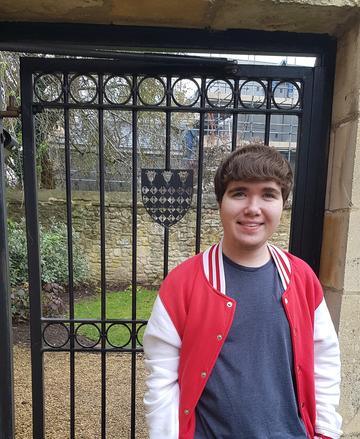My typical week as an Oxford History and Politics Undergraduate
It is worth prefacing by saying that every week can be different, and your week may vary
Daniel is a second year BA History and Politics student at Magdalen College. He is a disabled student and the first in his immediate family to go to university. Daniel is also a Trustee of Potential Plus UK, a Founding Ambassador and Expert Panel Member for Zero Gravity, and a History Faculty Ambassador. Before coming to university, Daniel studied at a non-selective state school, and was a participant on the UNIQ, Sutton Trust, and Social Mobility Foundation APP Reach programmes, as well as being part of the inaugural Opportunity Oxford cohort. Daniel is passionate about outreach and social mobility and ensuring all students have the best opportunity to succeed.

One of the questions many prospective students ask is what happens in a typical week – I hope this article will give an impression of this. It is worth prefacing by saying that every week can be different, and your week may vary dependant on how many papers you are doing as well as what societies you get involved in. During my first year, on average I had 1 essay a week, with a problem sheet or some work on computer software as an additional task.
Monday
I start the day with a Quantative Methods lecture, looking at how to conduct statistical tests and investigating how to establish causation (one factor is definitely causing a change in another factor). I then do some reading – for example one week I had to write an essay on the causes of populism, so I read around 7 pieces of literature (a mix of journal articles, book chapters, or skim reading longer books). I’ll try to keep my notes for a journal article to be around a page, picking out the key arguments and the evidence to support it. Throughout the day I’ll take regular breaks, responding to emails, having a snack, walking around my College’s grounds, or just taking time to think through what I have read. I try to stick to 10am-6pm for my study hours. In the evening I may go to an Oxford Union talk, or catch up with my household over a card game for instance.
Tuesday
Today I put on a lecture on the History of the British Isles 1500-1700, focusing on broad themes in the course like the nature of kingship or the role of parliament. I will then return to my reading for my Politics essay as they were usually due on Wednesday evenings, continuing to look through the literature for a broad range of causes and perspectives – I try to build on what I have already read, so looking for arguments which contradict previous authors, or facts and case studies which challenge my previously held views. Today I spend more time thinking about my general essay structure, considering what my three main points are going to be and what parts of the topic interest me most. I will also try to do some further reading on parts I don’t understand as well or on parts where I don’t feel I have enough evidence. Before finishing my study for the day, I will spend around 15 minutes putting on paper my plan which summarises my main points and ideas I have which I am not sure if I will include, and then I spend around an hour thinking about my introduction. I have found the best essays I write are those with the strongest introductions, introductions which clearly set out exactly what I want to say and trying to link the three points together to produce a cohesive response to the question. In the evening I may do some research for the charity I am a trustee of, or I will check my schedule for the next week to ensure I have reserved enough time for study and the other activities I want to participate in.
Wednesday
My lecture this morning is on the Practice of Politics, so looking at the UK or American systems of political leadership or how we can define and measure democracy among many other examples. The rest of the day is spent writing my essay due in the evening – essays usually have a maximum word count of 2,000 words, and I find I can usually say the most important points in that word count. Referencing is not too strict – as long as it is consistent then that is all that is needed, so I usually put the author last name and year in brackets after the sentence where I used their information, with a full bibliography at the end of my essay. I’ll try to write a full draft by around 2pm, which gives me some time to go for a walk before coming back to proofread my essay and then sending it off before the deadline. I already ordered my books for my next essay last week, so I will now order the materials I need for the essay due in 2 weeks time, or I’ll spend the time downloading the journal articles or checking access to online texts via the Oxford library system. I won’t do any work in the evening as the essay is now complete, so I will spend some time with friends or watch some videos to relax.
Thursday
Every Thursday I have a Theory of Politics lecture, so I will ensure to watch and make notes on this – topics include the role of civil society in democracy, power dynamics, or lectures on key authors like Marx or Mill. In the afternoon I have the tutorial for the essay I submitted, so I briefly look over what I wrote and my reading notes to pick out any areas I want to ask questions on, and then I will meet with up to two other students and a tutor for between one and two hours to discuss the content. I ensure to make notes of what we discuss and any new ideas I hadn’t thought of or new perspectives which I find give me a deeper understanding of the topic. For the rest of the day, I do things I enjoy like listening to music or participating in an Outreach Q&A with prospective students, or doing some work for the societies I am on the committees of – in the evening, I go to my College’s undergraduate body meeting at 7pm to take notes as I am the Secretary. In the meeting we discuss what has been going on with College, what we have heard from the College’s senior leadership, and any other issues or ideas we have had or heard of.
Friday
I have another Practice of Politics lecture this morning – lectures on average are usually between 50 and 60 minutes for my course, and I find them a good way to get ready for the day as it means I tick something off my to-do list straight away, and it gets me thinking before I move onto more demanding tasks. On Fridays I may spend some time revising if I only have one essay due in the week, I may start to look at reading for the next week, or work with the computer software I need for an assignment I had to write at the end of term on Political Analysis. Every two weeks for a term I would have a 1-2 hour lab on using the software, and then I had a week to complete an assignment which only took around 30 minutes-1 hour based off of the lab content; as terms are eight weeks, I had four labs (and in this case 3 assignments, plus an additional final assignment which was writing an essay based on real-world data in democracies). There was also some reading on Political Analysis, so I may spend some time reading this to get a greater understanding of political methods and the political science writing style. In the evening I again may be involved in some society work, I may go to an event with a speaker, or go to a social event. My College has on average 3 formals a week, including one on Friday, so this is an opportunity to have a three-course meal for around £7-£10 usually, and it is a great occasion to spend time with friends.
Saturday and Sunday
I will sleep in quite late to ensure I feel well-rested, and then do some shopping or go for a walk. In the afternoon I may do some reading, revision or some society work. In the evening I usually socialise, or I may get started early on writing an essay if I know I have a busy week coming up.
Oxford weeks can be very demanding and tiring, but at the same time equally fun and there is so much to get involved with. I hope this article has shown just some of the things I get involved with and what studying my subject is potentially like. If you want to see what a typical day looks like, you can watch this video that I produced for UNIQ.




